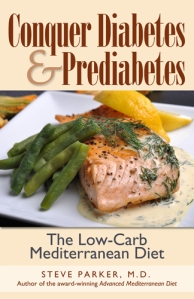Animal-based low-carb diets are linked to higher death rates, according to a recent study in the Annals of Internal Medicine. On the other hand, a vegetable-based low-carb diet was associated with a lower mortality rate, especially from cardiovascular disease.
As always, “association is not causation.”
![MP900214903[1]](https://diabeticmediterraneandiet.files.wordpress.com/2011/01/mp9002149031.jpg?w=200) It’s just a matter of time before someone asks me, “Haven’t you heard that low-carb diets cause premature death?” So I figured I’d better take a close look at the new research by Fung and associates.
It’s just a matter of time before someone asks me, “Haven’t you heard that low-carb diets cause premature death?” So I figured I’d better take a close look at the new research by Fung and associates.
It’s pretty weak and unconvincing. I have little to add to the cautious editorial by William Yancy, Matthew Maciejewski, and Kevin Schulman published in the same issue of Annals.
The study at hand was observational over many years, using data from the massive Nurses’ Health Study and Health Professionals’ Follow-up Study. To find the putative differences in mortality, the researchers had to compare the participants eating the most extreme diets. The 80% of study participants eating in between the extremes were neutral in terms of death rates.
They report that “…the overall low-carbohydrate diet score was only weakly associated with all-cause mortality.” Furthermore,
These results suggest that the health effects of a low-carbohydrate diet may depend on the type of protein and fat, and a diet that includes mostly vegetable sources of protein and fat is preferable to a diet with mostly animal sources of protein and fat.
In case you’re wondering, all these low-carb diets derived between 35 and 42% of energy (total calories) from carbohydrate, with an average of 37%. Anecdotally, many committed low-carbers chronically derive 20% of calories form carbohydrate (100 g of carb out of 2,000 calories/day). The average American eats 250 g of carb daily, 50-60% of total calories.
Yancy et al point out that “Fung and coworkers did not show a clear dose-response relationship in that there was not a clear progression of risk moving up or down the diet deciles.” If animal proteins and fats are lethal, you’d expect to see some dose-response relationship, with more deaths as animal consumption gradually increases over the deciles.
 The Fung study is suggestive but certainly not definitive. Anyone predisposed to dietarycaution who wants to eat lower-carb might benefit from eating fewer animal sources of protein and fat, and more vegetable sources. Fung leaves it entirely up to you to figure out how to do that. Compared to an animal-based low-carb diet, the healthier low-carb diet must subsitute more low-carb vegetables and higher-fat plants like nuts, seeds, seed oils and olive oil, and avocadoes, for example. What are higher-protein plants? Legumes?
The Fung study is suggestive but certainly not definitive. Anyone predisposed to dietarycaution who wants to eat lower-carb might benefit from eating fewer animal sources of protein and fat, and more vegetable sources. Fung leaves it entirely up to you to figure out how to do that. Compared to an animal-based low-carb diet, the healthier low-carb diet must subsitute more low-carb vegetables and higher-fat plants like nuts, seeds, seed oils and olive oil, and avocadoes, for example. What are higher-protein plants? Legumes?
You can see how much protein and fat are in your favorite vegetables at the USDA Nutrient Database.
The gist of Fung’s study dovetails with the health benefits linked to low-meat diets such as traditional Mediterranean and DASH. On the other hand, if an animal-based low-carb diet helps keep a bad excess weight problem under control, it too may by healthier than the standard American diet.
See the Yancy editorial for a much more detailed and cogent analysis. As is so often the case, “additional studies are needed.”
Steve Parker, M.D.
Reference: Fung TT, van Dam RM, Hankinson SE, Stampfer M, Willett WC, & Hu FB (2010). Low-carbohydrate diets and all-cause and cause-specific mortality: two cohort studies. Annals of internal medicine, 153 (5), 289-98 PMID: 20820038






![MP900214903[1]](https://diabeticmediterraneandiet.files.wordpress.com/2011/01/mp9002149031.jpg?w=200)

![MPj02556020000[1]](https://diabeticmediterraneandiet.files.wordpress.com/2010/04/mpj025560200001.jpg?w=300)


